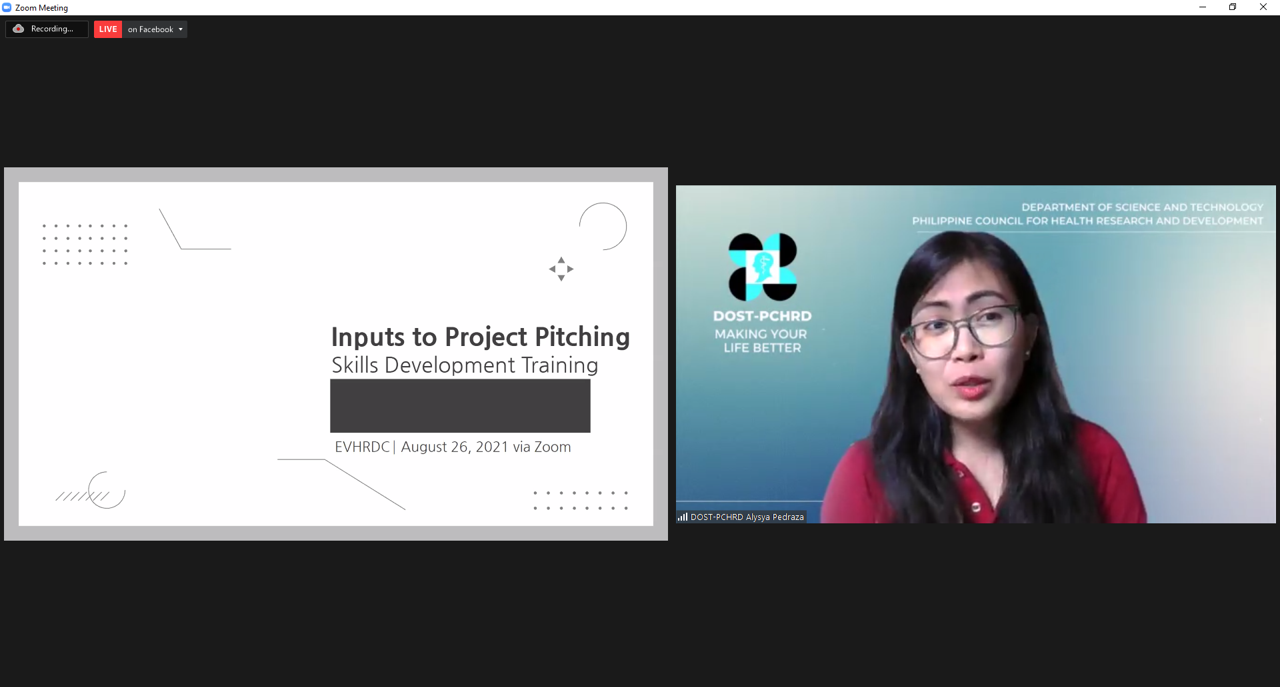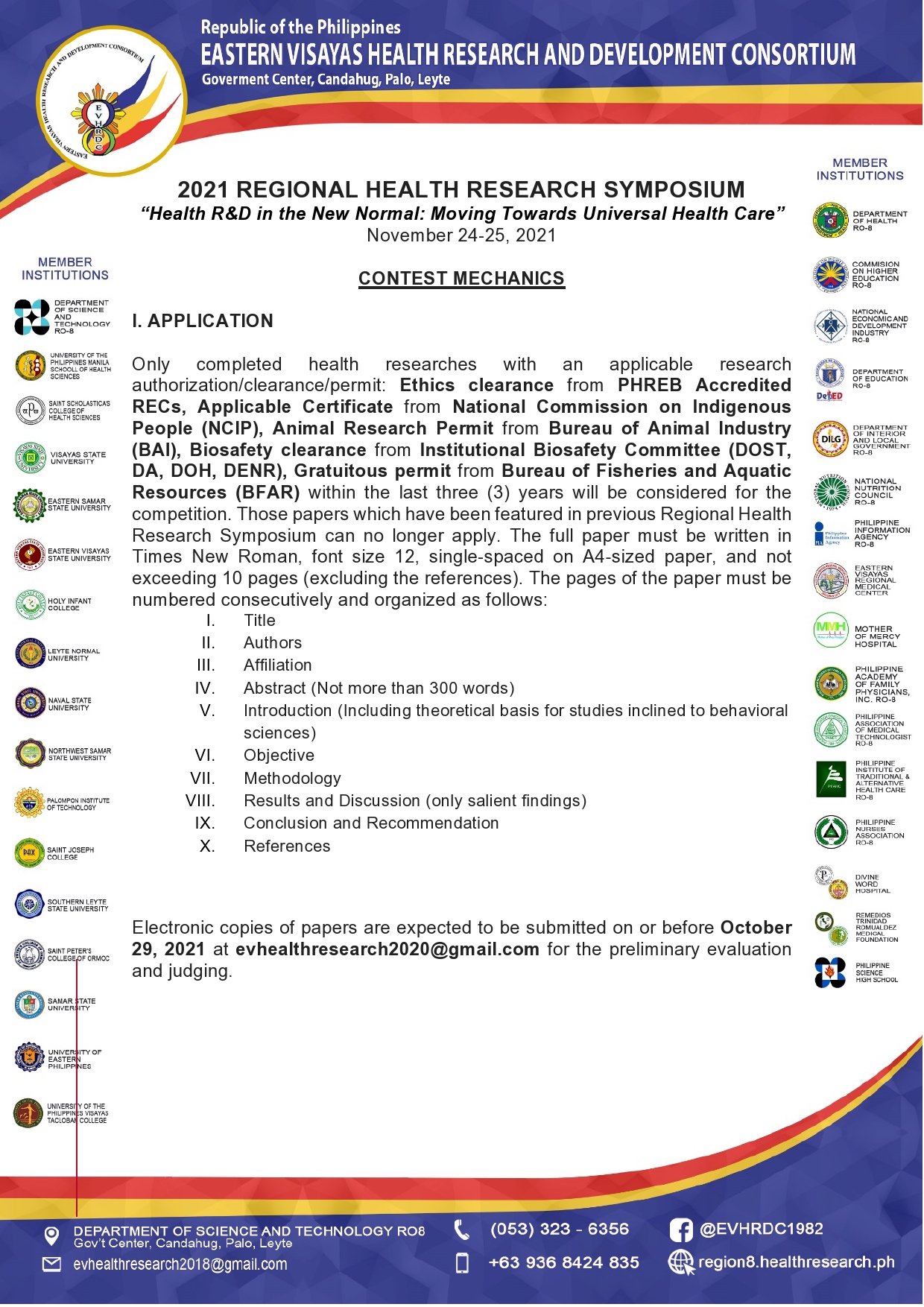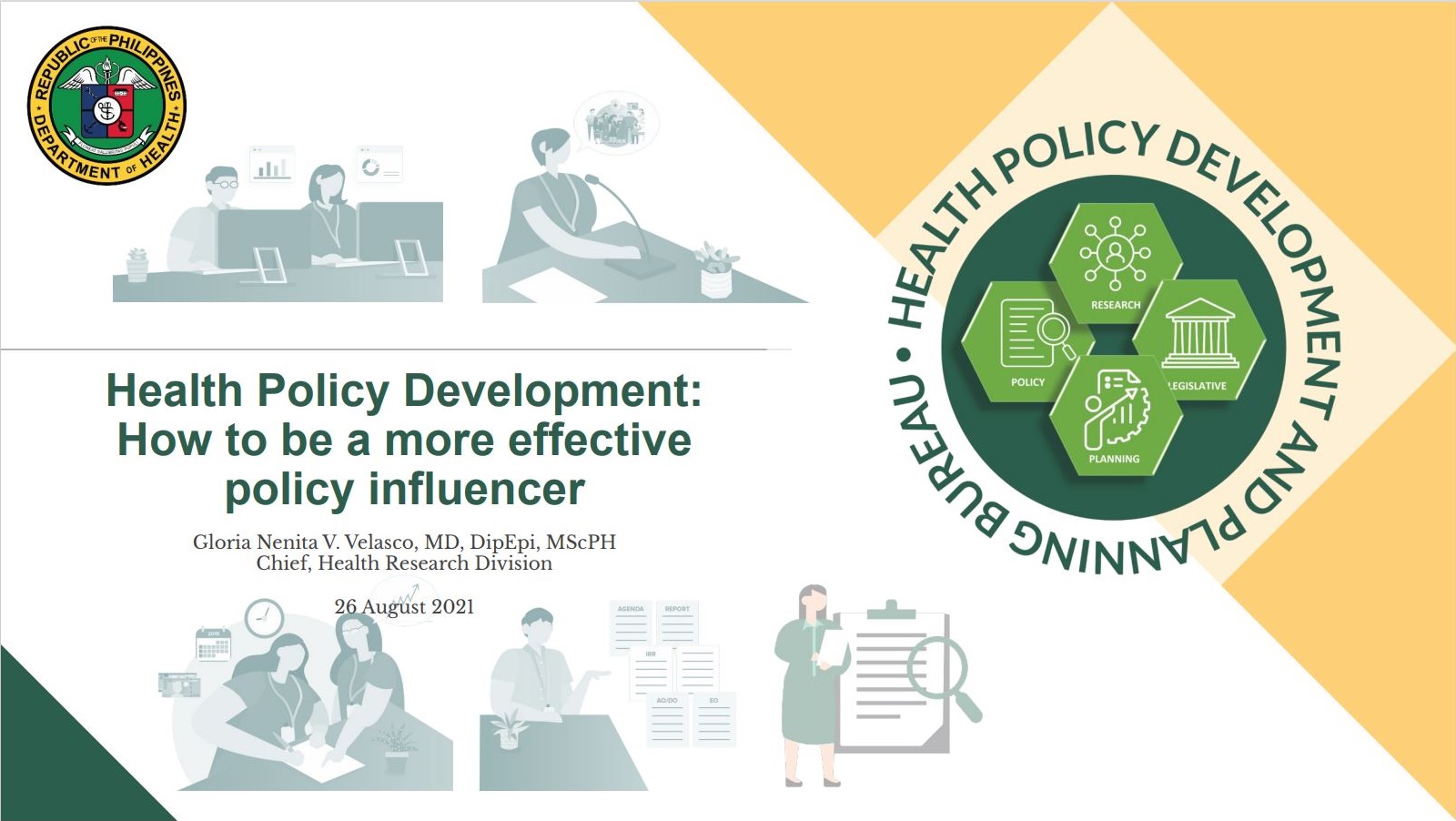Featured Videos
News
- Details
- Written by DOH - Jelyn
- Category: News
- Hits: 708
With the pursuit to ramp up the COVID-19 vaccination activities in Eastern Visayas, the Department of Health Eastern Visayas Center for Health Development together with the Regional Task Force against COVID-19, and the Regional COVID-19 Vaccination Operations Center, launched the Regional Vaccination Days- a massive vaccination campaign all over Region VIII starting January 31 until February 2.
The simultaneous implementation of the said vaccination drive in all six provinces aims to vaccinate at least 1 million individuals in three days; facilitate the vaccination activities and expedite vaccination of individuals with zero dose, those with due/missed second doses, and booster doses by devoting three days solely for vaccination activities regionwide.
As the Omicron variant looms in the region, this initiative is conducted while the region is currently under Alert Level 3, except for Northern Samar which was declared by the NIATF under Alert Level 4 until January 31. With the continued support of all partner agencies and private sectors, this is a window of opportunity for the Local Government Units (LGUs) to inoculate as many as possible, especially those coming from the vulnerable groups- the elderly, those with comorbidities, and those from indigent populations. The LGUs are ensured that there are enough supply of vaccines, vaccine logistics included, in the region to support this campaign. While the region has received a total of 6,345,060 doses of COVID-19 vaccines, necessary allocation and distribution has been processed by the DOH EVCHD and the RVOC to accommodate the vaccine supply of each province and/or LGU.
- Details
- Written by Sarina Joy Odivilas, DRD, PIA R08
- Category: News
- Hits: 1419
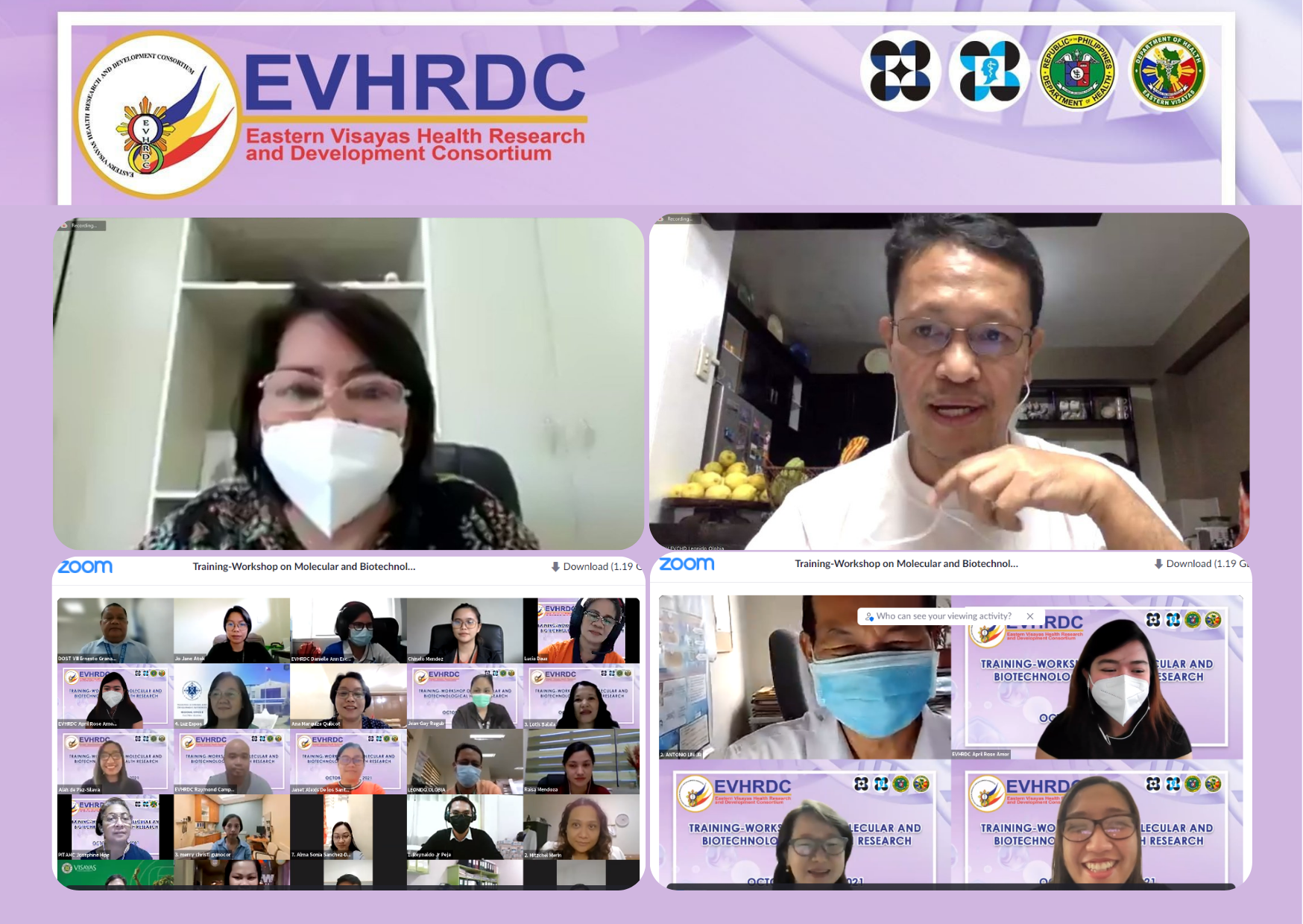 |
|
(Top left) EVHRDC Chairperson and DOH EVCHD Regional Dr. Exuperia B. Sabalberino and (top right) DOH EVCHD Research Coordinator and Chair of the EVHRDC RMC and TRB, Mr. Leonido P. Olobia, together with the (bottom left and right) participants in the event. |
The Eastern Visayas Health Research and Development Consortium (EVHRDC), spearheaded by the its Capacity Building Committee (CBC) and Research Management Committee (RMC), conducted a Training-Workshop on Molecular and Biotechnological Health Research on October 13, 14, & 15, 2021 from 9:00AM – 5:00PM via Zoom Conference.
The 3-day training’s goal was to encourage researchers from the consortium's member institutions to submit proposals for molecular and biotechnological health research that are relevant to Eastern Visayas' health needs. Mr. Leonido P. Olobia, DOH EVCHD Research Coordinator and Chair of the EVHRDC Research Management Committee (RMC) and Technical Research Board (TRB), explained that the activity was designed to help regional researchers develop research proposals aligned with molecular and biotechnological health research for possible funding by the consortium. He also added that these types of researches will open doors for innovations which can generate economic benefits and medical breakthroughs for Eastern Visayas in the future.
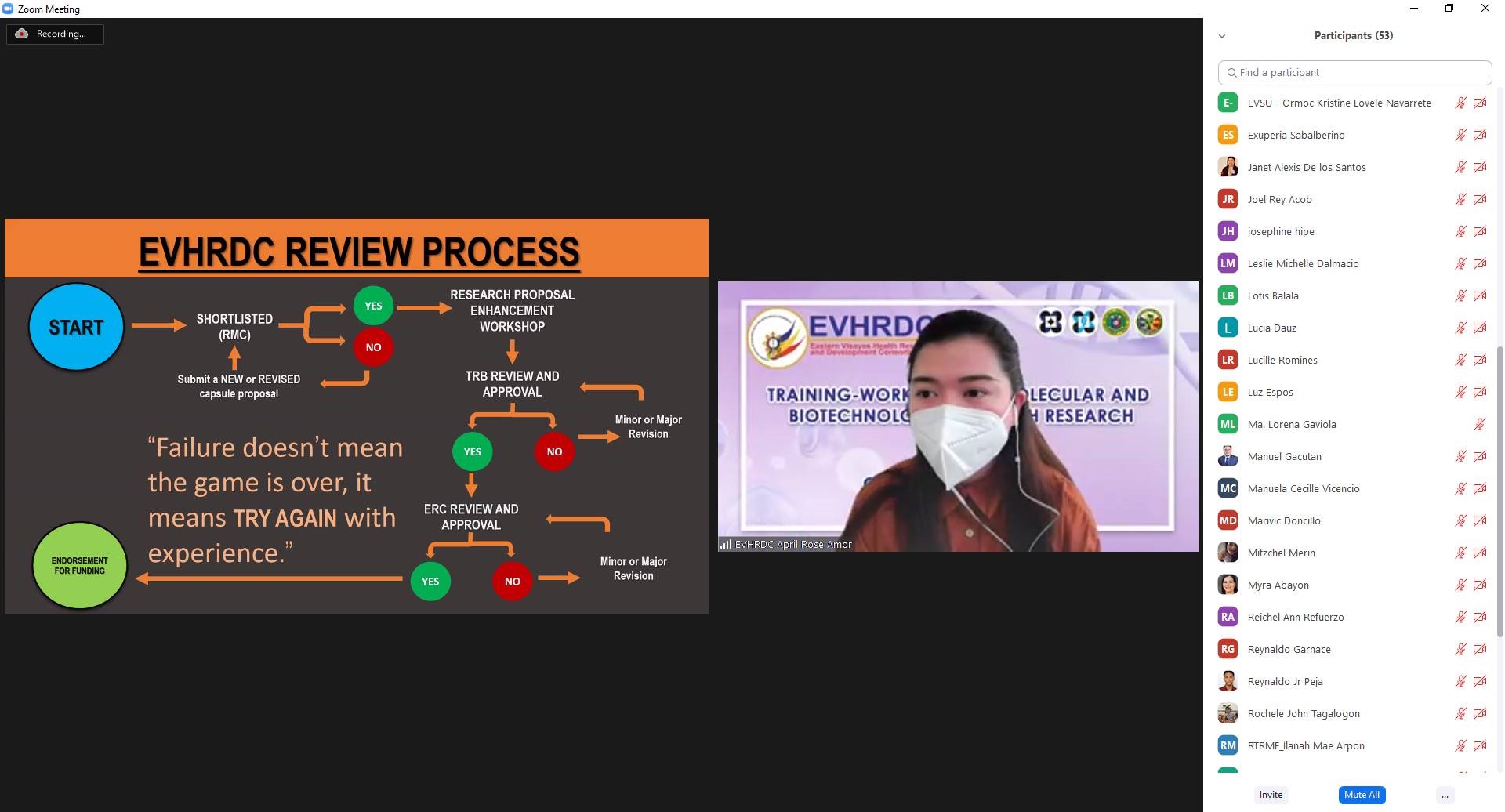 |
|
EVHRDC staff April Rose Amor discussing the EVHRDC review process to the participants. |
For the workshop proper, the first workshop focused on identifying research topics, as well as the rationale and significance of the selected topics. The second workshop was dedicated to the creation of the conceptual framework and the formulation of research objectives. During the third workshop, participants worked on defining their research design, methodology, work plan, and outputs based on the DOST 6Ps and their intended beneficiaries.
After the training workshop, participants were encouraged to submit their final capsule proposals. They are given until October 20, 2021 to submit their proposals. They were informed about the schedule of the RMC shortlisting which is October 25, 2021 and the Research Proposal Enhancement Workshop in November 2021.
Dr. Lucia P. Dauz, EVHRDC Director, and Engr. Ernesto M. Granada, DOST 8 Regional Director and EVHRDC ExeCom Co-Chair, presented Dr. Leslie Michelle Dalmacio and Dr. Sheriah Laine de Paz-Silava with certificates of recognition for serving as the activity's resource speakers.
- Details
- Written by EVHRDC
- Category: News
- Hits: 1908
The EVHRDC Awards is presented to researchers in Region 8 to recognize significant contributions to knowledge related to health. The awards will have two (2) categories: the Distinguished Health Researcher Award and the EVHRDC Outstanding Novice Researcher Award. Up to three awards may be given annually under the two award categories. The selection committee may not confer any of the awards once no one meets the qualifications.
Eligibility for Distinguished Health Researcher Award
The Distinguished Health Researcher Award is open to all Filipino Citizen researchers of Region 8-Eastern Visayas (whether individual or group/institutional categories) of the affiliated members of the Eastern Visayas Health Research Development Consortium (EVHRDC) and other interested colleges, universities, and agencies not affiliated with EVHRDC. The award shall have no age restrictions and can be granted posthumously.
Eligibility for EVHRDC Outstanding Novice Researcher Award
This aims to encourage young researchers to undertake work in all fields of health research. The award will be granted to researchers within Eastern Visayas region that are employed by the member institutions of the consortium. This award shall be conferred to young researchers not exceeding the age of 40 at the time of nomination.
Selection Criteria
The Distinguished Health Researcher Award may be conferred to an individual or a group while the EVHRDC Outstanding Novice Researcher Award is conferred to individuals who have made a significant contribution to health. This contribution could be a long-term, cumulative contribution or a single, particularly insightful idea, experiment, application, or interpretation.
The selection committee shall consider the following criteria in selecting the recipient:
- Demonstrated excellence in research, scholarly, and/or artistic work;
- Recognition by professional societies, community organizations, or other external bodies;
- Contributions to the research environment both locally, nationally, and internationally. This can include the development of major research installations (e.g. a research centre), participation in the deliberations of a major research granting agency (e.g. member and/or chair of a grant selection committee), or other prestigious forms of service to the field;
- Contributions to the training and education of highly qualified personnel (e.g., undergraduate and graduate students, postdoctoral fellows, and technical staff);
- The selection committee reserves the right to make fewer than three awards or none at all in any year if there are no suitable candidates;
- The institution of the individual or group researcher/s shall also be recognized;
- The selection committee shall determine the award category of a candidate/nominee. Distinguished Health Researcher nominee should have a minimum of five (5) completed health researches conducted, and the EVHRDC Outstanding Novice Researcher nominee should have one or a maximum of four (4) researche/s.
The Distinguished Health Researcher Awardees and EVHRDC Outstanding Novice Researcher Awardees shall be chosen by the Board of Judges. Decisions of the Board of Judges shall be final and unappealable. The Board of Judges has the right not to declare any winner. The Board of Judges shall formulate their own guidelines of judging based on the suggested criteria:
| Extent of impact on health/quality of life | 40% |
| Economic benefits | 30% |
| S&T benefits | 10% |
| Research Pitching and Publications | 10% |
| Research Training Involvement | 10% |
| 100% |
Nomination Procedures
1.Candidates may be nominated by a colleague, any individual, any agency, or self-nomination may be allowed. The nominator should be of someone in higher stature than the nominee. It could be someone the nominee had worked with, i.e., mentor, consultant, or workmate.
2. The nomination package must include:
2.1. A letter from the nominator summarizing the candidate’s research achievements and outlining the national or international significance of the candidate’s scholarly work. (The nomination letter should not exceed 300 words);
2.2. Current curriculum vitae of the candidate;
2.3. Three letters of support from scholars in the candidate’s main or cognate fields, commenting on the impact of the candidates’ work regionally, nationally, and internationally. At least two of these letters must be from scholars outside the workplace.
Submit your nominations here: https://forms.gle/kSdg8UtBZJX1m9D66
==>EVHRDC Awards Nomination Form
THE DEADLINE IS EXTENDED UNTIL: OCTOBER 15, 2021
- Details
- Written by EVHRDC
- Category: News
- Hits: 1512
The Eastern Visayas Health Research and Development Consortium (EVHRDC) in its commitment to promote and empower health research activities in Region 8, will be conducting its 2021 Regional Health Research Symposium (RHRS) on November 24-25, 2021 via Zoom. This year, the symposium is anchored with the theme “Health R&D in the New Normal: Moving Towards Universal Health Care”. Among the highlights of the activity are the region-wide contest for Oral Research Paper Presentations, Poster Exhibits and 3-Minute Pitch both in professional and undergraduate categories where modest amount of cash prizes will be given to the winners.
The submission of electronic copies of papers is EXTENDED until November 5, 2021, kindly send your entries at This email address is being protected from spambots. You need JavaScript enabled to view it. for the preliminary evaluation and judging.
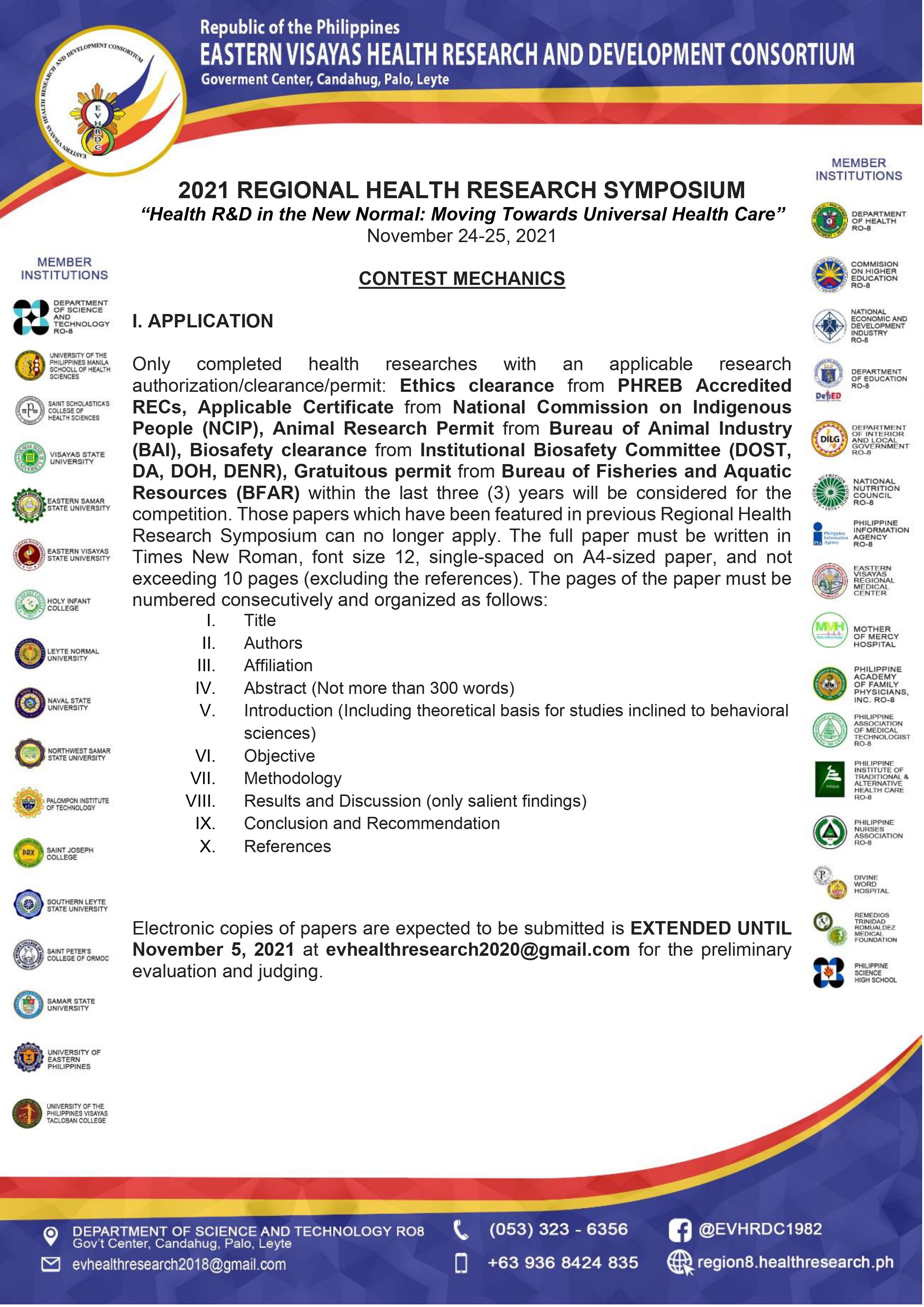
- Details
- Written by Dr. Francis Ann R. Sy, SLSU
- Category: News
- Hits: 1402
“Skills Development Training for Project Pitching”- this was the theme of the webinar attended by 93 participants who are researchers from member institutions of Eastern Visayas Health Research and Development Consortium (EVHRDC). The activity was held last August 26, 2021, via Zoom Conference.
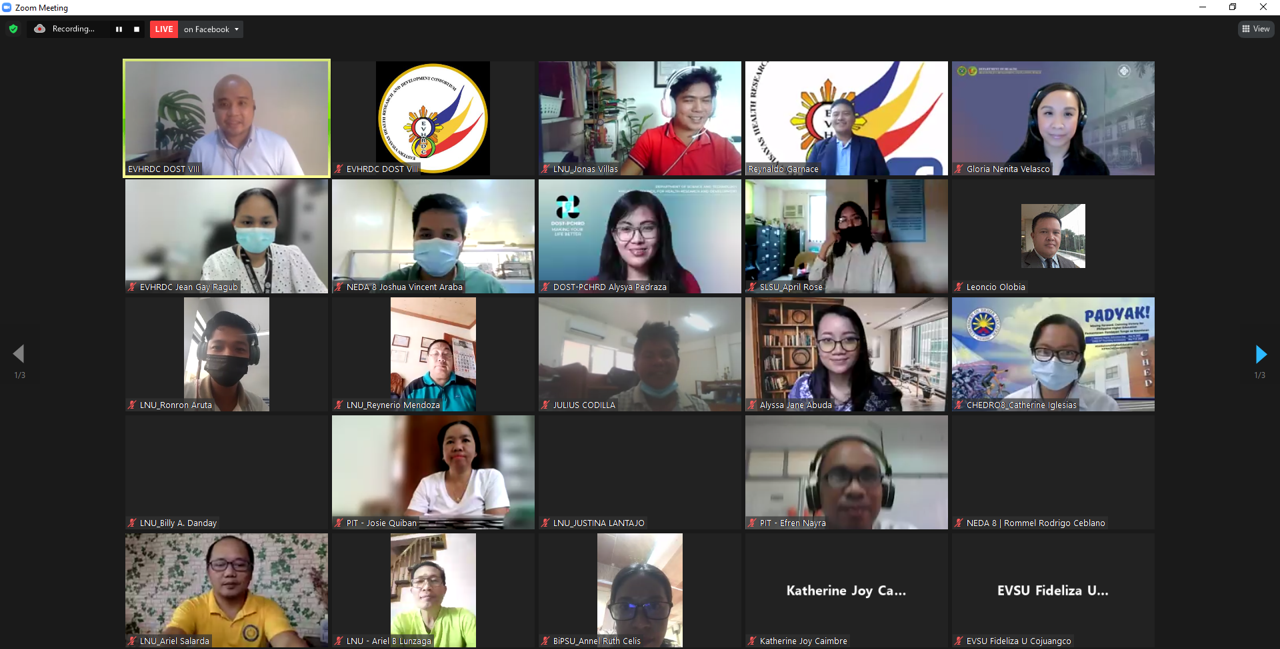
Dir, Ernesto M. Granada, DOST 8 Regional Director and Co-chair of EVHRDC Executive committee, opened and welcomed all participants to the activity. Dr. Sherrie Ann C. Labid, RUC Chair, delivered the rationale of the webinar. Ms. Jean Gay O. Ragub, the EVHRD Coordinator, introduced the resource speaker Dr. Gloria Nenita Velasco, The Chief Health Policy Development and Planning Bureau Health Research Division DOH.
Among the topics highlighted are Health Policy, Types of Policy Instruments Concept of Policy Cycle, Gap and window, how to develop a policy brief or presentation and its types, Difference between the policy presentation and the research presentation.
She emphasized that the policy presentation must be specific and actionable, deter the use of the same presentation for all target audiences in all instances, and should not get discouraged if they do not get the response they were expecting.

After the presentation, the workshop commenced, wherein participants were grouped and moved to their break-out rooms. The participants should reflect their presentation on the answer to the questions provided.The workshop was followed by presentations of their outputs and critiquing of presentations by Dr. Velasco.
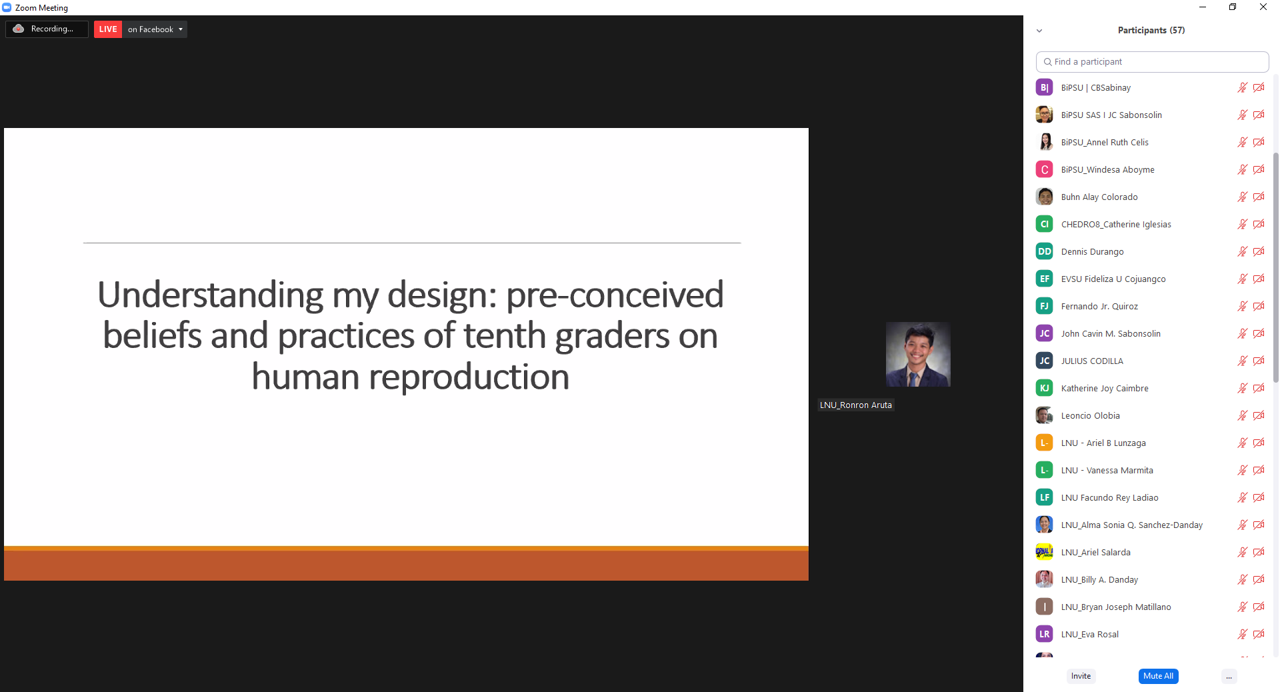
Ms. Alysya Marie Pedraza, the Cluster Head of PCHRD Visayas, delivered her insight and inspirational message. A certificate was awarded to the resource speaker by Dr. Reynaldo Garnace, CBC Member. The activity was formally closed with his closing remark.
